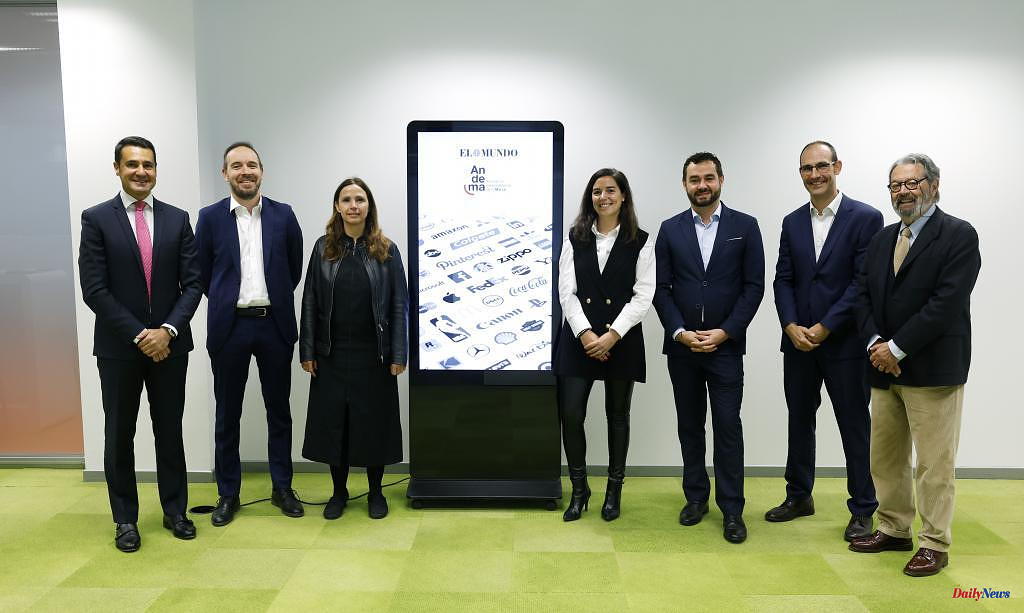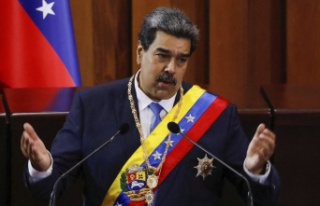In the beginning it was (and now is and for a long time will be) the sign. With the ability to order reality into concepts, humanity began a journey that has led it to this complex 21st century. To improve the efficiency in the satisfaction of its individuals, the sign was outlined in the economic area until reaching achievements such as that of the brand, that fascinating and sometimes mysterious intermediary between those who develop a product or service and those of us who consume it. To unravel its incorporeal essence and its very specific incidence, EL MUNDO and Andema met a panel of experts on April 19 at the round table "Value of brand intangibles", which took place at the Unidad headquarters Editorial.
Cristina Alonso, editor of EL MUNDO, moderated a discussion in which Aida Fernández, director of the Spanish Patent and Trademark Office (OEPM); Jordi Montaña, emeritus professor at ESADE and technical director of the Andema Study Center; Marc Díaz, CEO of Panasonic Heating
Alonso focused the core of the debate on the "unknown and even enigmatic in its essence" nature of trademarks, as well as the difficulty of "quantifying" their incidence. Sanz opened the fire with an intuitive, sensory response to the question about what is behind this mystery: "If we close our eyes and they mention a specific brand, a series of associated attributes come to us: intangibles are built from the union of realities that we are incorporating into the brand". More conceptual, López, pointed out that what underlies a brand is "a meaning, a value, a generation of long-term value" that is related to "an identity, a culture, values and attributes. To the extent that everything this is identified with something positive, there will be a good brand".
Montaña specified by pointing directly to quality, that is, "to a good product or service, a good company, a good person, in short, something very good. Without that, there can never be a powerful brand in the medium and long term". He also recalled that "the role of the employees themselves in brand generation" is often forgotten. Fernández, for his part, added the need to "register it so that all those elements we are talking about are protected and can be placed more safely in the markets."
Díaz brought the experience of Panasonic, a company whose origins go back to 1918: "For us it is a question of consistency: the founder of the company saw a need in the society of his time and began to manufacture lights for bicycles of the workers, efficient and durable lamps. Then the three values that we have maintained until today were forged: product, innovation and help to society"; although the way of concretizing these values varies: "That help to society today translates especially, for example, into the emphasis on sustainability."
Precisely, Pina associated the notion of consistency with that of "transparency", an attribute "that does not require investment so much as a way of doing things, sometimes something as simple as doing what is said, not resorting to misleading advertising, for example". Along the same lines, it is essential for the brand to "be recognized for the role it plays in people's lives: if it disappeared tomorrow, who would miss it? For that, an active purpose is necessary." Finally, Pina agreed with Díaz on the importance of "the vocation to solve society's problems, what I call a regenerative vision: not only focusing on causing less damage, but on solving specific problems, as is the case with sustainability".
On the key issue of investment, Fernández recalled that "Spain is the third country in the EU that registers its trademarks the most, an investment that results in their protection." This information led her "to the issue of communication: you also have to invest in making young people see that counterfeiting puts jobs and tax collection at risk, but above all you have to be clever and emphasize issues that affect them they are especially interested in, such as the impact on the environment".
The balance on the strength of the brand concept in our country showed shadows but a conclusion that was at least hopeful. For López, "in Spain we have a competitive disadvantage in this sense. We must work to better understand the production of these intangible assets and grow more both in investment and in value; the good news is that we are currently more so than other countries. Raising awareness is vital, and not only for the public sector, with its leadership capacity, but also for companies and the whole of society". In the more specific field of management, he added the fundamentals of having "homogeneous metrics shared by all", because "until now exclusively financial indicators have dominated management standards".
Guiu concluded with an interesting nuance of the round table: "Intangibles have to be translated into tangibles. When Uliver creates the Soy Frigo program to promote employment among young people and groups at risk of exclusion, that is something tangible and invites me to buy Frigo; when HP makes building an ecosystem of racial and gender equality a priority this year, that's tangible to me; when Mondelez launches its Harmony Sustainable Agriculture Pledge to farm wheat with less environmental impact, that It's tangible."
According to the criteria of The Trust Project












